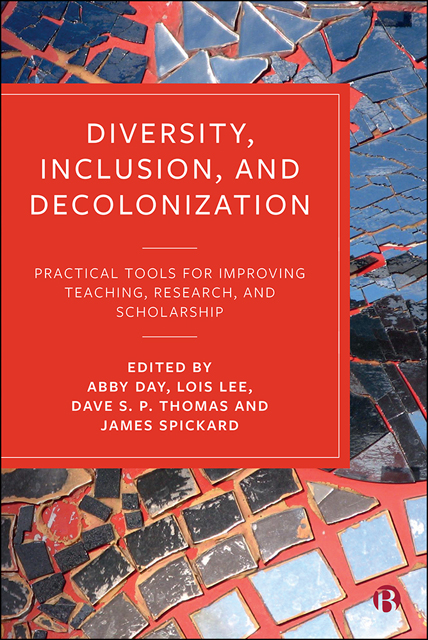 Diversity, Inclusion, and Decolonization
Diversity, Inclusion, and Decolonization Book contents
- Frontmatter
- Contents
- List of Figures and Tables
- Notes on Contributors
- Acknowledgements
- Typographical Note
- Introduction: Why Diversity, Inclusion, and Decolonization Matter
- Part I Changing Universities
- Part II Diversifying Curricula
- Part III Diversifying Research and Scholarship
- Part IV Overcoming Intellectual Colonialism
- Epilogue: What We Have Learned
- Index
6 - How ‘Diverse’ is Your Reading List? Tools, Tips, and Challenges
Published online by Cambridge University Press: 13 October 2022
- Frontmatter
- Contents
- List of Figures and Tables
- Notes on Contributors
- Acknowledgements
- Typographical Note
- Introduction: Why Diversity, Inclusion, and Decolonization Matter
- Part I Changing Universities
- Part II Diversifying Curricula
- Part III Diversifying Research and Scholarship
- Part IV Overcoming Intellectual Colonialism
- Epilogue: What We Have Learned
- Index
Summary
Introduction: The shifting context for curriculum reform in the United Kingdom
Around the world, there is a strong and growing imperative to develop inclusive and diverse reading lists in higher education. Such reform of syllabi constitutes a small but important step in the process of transforming university curricula. In the United Kingdom (UK), the content of curricula in higher education has long been a site for contestation (for example, Peters, 2018; Andrews, 2019), with the 2019– 21 Black Lives Matters (BLM) campaigns underscoring the importance of reforming curricula as part of efforts to address racial inequalities and decolonise the university (Bhambra et al, 2018; Doku, 2020). In historical perspective, calls for reform have been anchored in a range of narratives. In the decade since 2010, developing global curricula was part of the ‘internationalisation’ of UK universities who sought to adopt an increasingly global outlook and develop syllabi fitting for the growing international student cohort (Luxon and Peelo, 2009; May and Spalding, 2014). Simultaneously, the growth of the widening participation agenda, with a focus on equal opportunities for UK-domiciled students, highlighted the need for curricula to foster success for all students, irrelevant of background (Bowl, 2018). In more recent years, the drive towards ‘equality’ has gradually been replaced with an agenda based on ‘diversity’, and then ‘inclusion,’ and so mirroring the discursive shifts observed in other organisations (Oswick and Noon, 2014; Bowl, 2018; Brewis, 2019). While the drivers for curriculum reform have shifted, institutional responses of UK universities have long been subject to critique for inserting perspectives into syllabi without challenging mainstream content or practices (Robson, 2015; Clifford and Montgomery, 2017), recognising historical inequalities (Ahmed, 2007), or questioning the neoliberal frameworks within which such strategies sit (Gyamera and Burke, 2018). It is only more recently that the agenda for curriculum change has been shaped in line with a ‘transformational’ approach that challenges ‘traditional views and assumptions; encourages new ways of thinking; and reconceptualises the field in light of new knowledge, scholarship and ways of knowing’ (Kitano, 1997, p 23).
- Type
- Chapter
- Information
- Diversity, Inclusion, and DecolonizationPractical Tools for Improving Teaching, Research, and Scholarship, pp. 97 - 109Publisher: Bristol University PressPrint publication year: 2022


